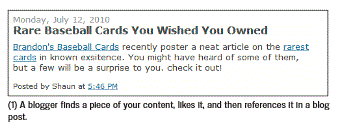On Monday I did a post about John Mueller’s responses on my questions concerning Disavows.
I found 2 other times in that discussion that were not mentioned in my original post, but I felt were worth noting to the public. The first has to do with the Search Engine Optimization Starter Guide put out by Google in 2008, where the example Google gives of a “good link” sure looks un-natural and “paid” in today’s world.
The second has to do with “If you got an automatic penalty (not manual), do you need to get links removed, or is doing the disavow enough?”
So here ya go!
Question by Lexi, Poland: “On 14th page of http://goo.gl/leJs3b (Google guide from 2008) there’s an example of natural link: a well optimized link in text. Nowadays such links are shown as examples of unnatural ones, especially because of keywords in anchors. Can you clarify?”
John: Okay the example here is, “Brandon’s Baseball Cards recently posted an article on the rarest cards in known existence.” So I think the point is kind of right that this does look like an unnatural backlink. The caption here is, “A blogger finds a piece of your content, likes it, and then references it in a blog post.” It’s a good point to make, yeah. But I think…
Jim: I followed that guideline in ’08 and now I’m disavowing ’em!
[Laughter]
John: I guess this is an extreme example, but seems like something we could make a little bit more natural looking at least as an example, yeah. Good point.
Question by Benjamin Seaver: “What’s the best way to show your history of email correspondence with sites refusing to remove links or not responding at all? Is just copy/pasting the email text into a Google Doc and then sharing the link sufficient?”
John: In general what the webspam team wants to see is that you’re spending a reasonable amount of effort to actually clean up these problems. And for that they don’t need like a Cc of every email that you’ve ever sent out, it’s kind of enough to see that you have this list of sites that you contacted, some of them responded, some of them didn’t respond, some of them responded positively and made a chance, some of them might not have made a change and having that information in a spreadsheet, for example, is very useful.
If there’s some email that really documents how you’re working with these guys to resolve this problem then maybe it’s good to include a copy or link to a shard doc. I wouldn’t go overboard by really like listing like all emails and all addresses that you’ve contacted in these docs because that’s something that the webspam team probably isn’t going to look at in detail. They just want to see that you’re really spending a significant amount of time to clean up this problem so that they can kind of be sure that you’re not going to turn around and do it again.
Jim: So John, if you were hit by an algorithmic penalty, so then you don’t have to do a reconsideration request, you don’t have to show like everywhere that you emailed… if no one removes their link but you do the disavow, is that good enough or does a certain amount of that stuff have to go away in order to get out?
John: Algorithmically what would probably happen is we’d see that as similar to the webmaster having placed a nofollow link on those pages so to a large extent I imagine that’s something that we would just process automatically and that’s not something where you’d need to specifically remove everything. So essentially the disavow kind of processes it all on an algorithmic basis.
Jim: So if you were hit by an algorithmic update and not the manual then you really don’t have to send the emails you can just use the disavow.
John: At the same time if you’re just using a disavow like that and someone from the manual webspam team takes a look then they’re probably…
Jim: But if it’s automatic – an auto one – so if you didn’t receive the email from Google and you were hit then you don’t have to send the emails then correct? You can just use the disavow.
John: Theoretically you could do that, yeah. But it’s something where I think from just a general point of view it’s something where I, especially if you’re seeing that it’s something very strong – kind of a strong algorithmic reaction – that’s something where I at least kind of be weary of the webspam team maybe taking a look as well at some point and really trying to clean up this problem in a way that you don’t have to worry about it again in the future by actually trying to get these links removed as well.
Yehoshua: But if you went through the process of doing the disavow, even if the manual webspam team did take a look, can’t you just say, “Hey, I’m trying to clean up my act. I went through the process of doing a disavow list.” Why do you have to, why would there be a separate level of concern from the manual webspam team if you already went through the trouble to “do the right thing” by doing the disavow?
Baruch: Because they wanna see good faith.
John: The manual webspam team wants to see that you’re actually taking steps to clean up this problem and if the only thing you’ve done is like submit a disavow file with all of your links in it then that’s something that they’re not going to be that happy about. And that’s something where obviously it’s not something that’s guaranteed to happen every time that there are bad backlinks out there but it’s something where it can happen and if you’re kind of trying to catch these issues before they become a real problem for your website then that’s something I’d at least try to clean up.
To read the other things said by Jim and John about disavowing during the group chat, see this page.
If you need a disavow analysis, let me know…I’d love to help…I enjoy analyzing backlinks, and our private tools give us a better look than anything on the marketet for finding patterns which could be causing your issues….while not removing the links that are “fine”, and are helping you…it’s an art…it’s a science…it’s what I’ve been doing every day for the past several months.





24 Responses
Part 2: John Mueller and Jim talk Disavows – The lost transcripts.: On Monday I did a post about John Mueller’… http://t.co/2o49edY1Xo
New @webuildpages: Part 2: John Mueller and Jim talk Disavows – The lost transcripts. http://t.co/Vg14d6WTJy
Freshly fresh. Part 2: John Mueller and Jim talk Disavows – The lost transcripts. http://t.co/hIZKE1pjLL
Part 2: John Mueller and Jim talk Disavows – The lost transcripts. http://t.co/TScz6EPgAK
Part 2: John Mueller and Jim talk Disavows – The lost transcripts. http://t.co/lJ5NQv42MR
Part 2: John Mueller and Jim talk Disavows – The lost transcripts. http://t.co/PSggobsZOr #harrogateseo
Part 2: John Mueller and @jimboykin talk Disavows – The lost transcripts. http://t.co/Oselp6LFxY
RT @jimboykin: Part 2: John Mueller and @jimboykin talk Disavows – The lost transcripts. http://t.co/Oselp6LFxY
Part 2: John Mueller and Jim talk Disavows – The lost transcripts.: http://t.co/308esqhi9P #seo http://t.co/GiQdyjrCjd
Part 2: John Mueller and Jim talk Disavows – The lost transcripts. – http://t.co/DoNwYe8sRB
Part 2: John Mueller and Jim talk Disavows – The lost transcripts. http://t.co/qeZOnK5MGE
@ViperChill part 2 of my questions about #disavow to john mueller http://t.co/7a98CmGaMu
Part 2: John Mueller and Jim talk Disavows – The lost transcripts. @NinjasMarketing http://t.co/lC7Pc3HmQV
John Mueller and Jim Boykin talk Disavow Carnage – The lost transcripts. Via @NinjasMarketing http://t.co/DBWNqkTql9
Part 2: John Mueller and Jim talk Disavows – The lost transcripts. @NinjasMarketing http://t.co/Q0D0w7Kmuw
Part 2 @jimboykin questions John Mueller about #disavow http://t.co/7a98CmGaMu
RT @jimboykin: Part 2 @jimboykin questions John Mueller about #disavow http://t.co/7a98CmGaMu
*Great stuff* – @jimboykin pt:2 johm mueller and Jim talk disavows_the lost transcripts http://t.co/IPEkqA9hnP
RT @bnnejn: *Great stuff* – @jimboykin pt:2 johm mueller and Jim talk disavows_the lost transcripts http://t.co/IPEkqA9hnP
RT @bnnejn: *Great stuff* – @jimboykin pt:2 johm mueller and Jim talk disavows_the lost transcripts http://t.co/IPEkqA9hnP
Part 2: John Mueller and Jim talk Disavows – The lost transcripts. @NinjasMarketing http://t.co/m9hxVoYkC9
Part Deux of the missing transcripts @jimboykin and @JohnMu talking about disavow http://t.co/cRu7h5Ixzw
Part 2: John Mueller and Jim talk Disavows – The lost transcripts. http://t.co/mVgSAz9xIp
You know it makes me wonder why these blog comment pages still ask for a website.. Why would I put a website address here? Google is just gonna penalize it right?
I have a question .. if there is no manual action message, do you still need to dissavow links that you know are out there? I have a site that is getting zero results. It’s a niche site so it should be showing up in some places but nothing. I know there could be some bad links out there, should I dissavow them? Would this help my site to get out of the gutter?
Comments are closed.